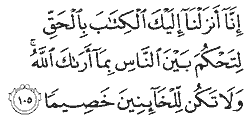Living The Quran
From Issue: 683 [Read full issue]
Judging by Revelation
Al-Nisa (Women) - Chapter 4: Verse 105
 "(O Messenger) We have revealed to you this Book with the Truth so that you may judge between people in accordance with what Allah has shown you. So do not dispute on behalf of the dishonest."
"(O Messenger) We have revealed to you this Book with the Truth so that you may judge between people in accordance with what Allah has shown you. So do not dispute on behalf of the dishonest."
At the highly critical juncture in the life of the new Muslim community in Madinah, this verse and the ones that follow were revealed from on high giving instructions to God's Messenger and the Muslim community to ensure that justice was done to a Jewish person who was wrongly accused of theft.
The incident involved a person called Tu'mah or Bashir ibn Ubayriq of the Banu Zafar tribe of the Ansar. This man stole a shield that belonged to another Ansar Rifa'ah. Rifa'ah's nephew Qatadah ibn al-Nu'man approached the Prophet, peace be upon him, and expressed his suspicion about Tu'mah. But Tu'mah, his kinsmen and many of the Banu Zafar colluded to ascribe the guilt to a Jew called Zayd ibn al-Samin (Tu'mah placed the shield in Zayd's home). When Zayd was asked about the matter once the shield was found in his home he pleaded that he was not guilty. Tu'mahs' supporters on the other hand, waged a vigorous propaganda campaign to save Tu'mah's skin. They argued that Zayd, who had denied the Truth and disbelieved in God and the Prophet, was absolutely untrustworthy, and his statement ought to be rejected outright. The Prophet was about to decide the case against Zayd on formal grounds and to censure Qatadah for slandering Tu'mah, but before he could do so, the whole matter was laid bare by this revelation from God.
In this and the following verses the Muslims are strongly censured for supporting criminals for no other reason than either family or tribal solidarity and were told that they should not allow prejudice to interfere with the principle of equal justice for all.
With reference to the words: "By what Allah has shown you," Umar has said: "Let none of you say, I did this or that, by what Allah has showed me (as the right thing). Because, such a "showing" by Allah was only to His Prophet. As for us, our opinions can be both right as well as wrong." In fact, when someone told Umar in a case that he should judge by what "Allah showed him," Umar reprimanded him and said that that was the prerogative of the Prophet, peace be upon him.
Compiled From:
"In the Shade of The Quran" - Sayyid Qutb, Vol 3, pp. 297, 298
"Towards Understanding the Quran" - Sayyid Abul Ala Mawdudi, Vol 2, pp. 81, 82
"Tafsir Ishraq Al-Ma'ani" - Syed Iqbal Zaheer, Vol 2, pp. 318, 319